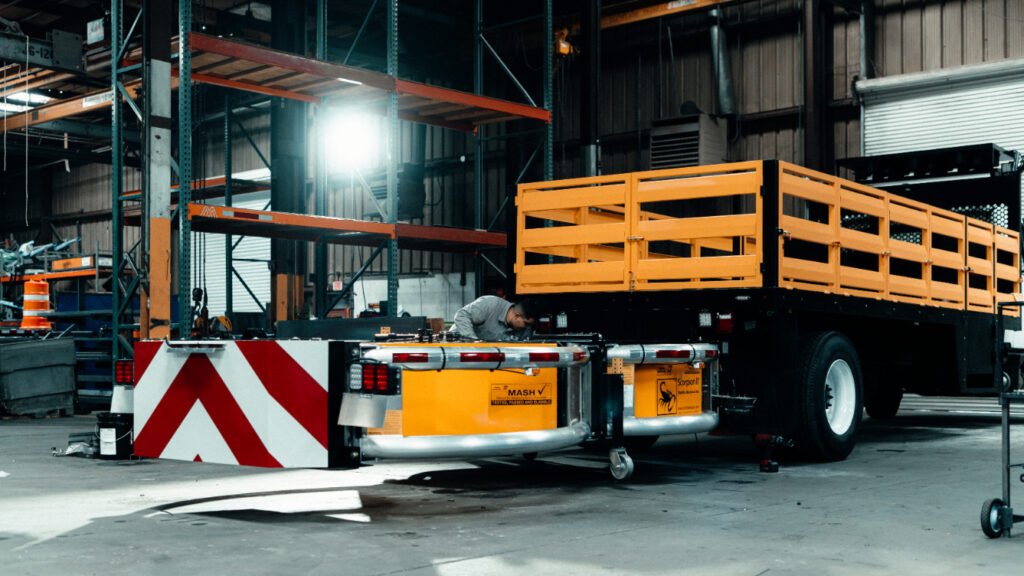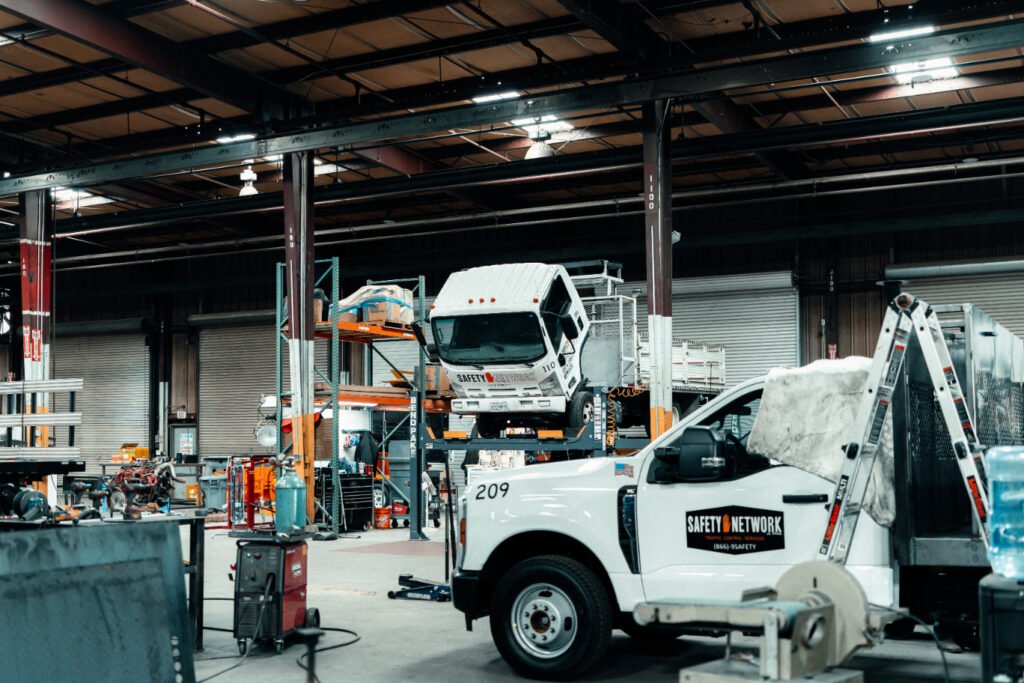For construction companies, traffic control providers, and contractors, maintaining a fleet of vehicles and equipment is critical to ensuring seamless operations on the job site. However, when projects wrap up, proper fleet storage becomes essential to preserve the longevity and performance of your assets. At Western Highways Traffic Safety, we understand the importance of protecting your fleet during downtime. In this comprehensive guide, we’ll share expert fleet storage tips to maximize longevity between projects, helping you save on maintenance costs and keep your equipment ready for action. Whether you manage a small fleet or a large one, our solutions ensure your vehicles and tools are in top shape when the next project begins.

Why Proper Fleet Storage Matters
Fleet vehicles and equipment, such as traffic control trucks, signage rigs, and heavy machinery, represent significant investments. Improper storage during downtime can lead to costly damage, including rust, mechanical failures, and reduced operational efficiency. Effective storage practices offer:
- Extended Equipment Lifespan: Proper care prevents wear and tear, prolonging usability.
- Cost Savings: Avoiding repairs and premature replacements boosts your bottom line.
- Project Readiness: Well-maintained equipment ensures quick deployment for new projects.
- Safety Compliance: Stored vehicles remain in optimal condition, meeting safety standards.
At Western Highways Traffic Safety, we’re committed to helping you protect your fleet with practical, proven storage strategies. Contact us at (559) 785-1400 or info@westernhighwaystrafficsafety.com for expert advice tailored to your needs.
Key Fleet Storage Tips for Longevity
Proper fleet storage requires careful planning and execution. Below, we outline essential tips to ensure your vehicles and equipment remain in prime condition between projects.
1. Clean and Inspect Before Storage
Before storing your fleet, thorough cleaning and inspection are crucial:
- Wash Vehicles: Remove dirt, road salt, and debris to prevent corrosion, especially on traffic control trucks exposed to harsh conditions.
- Inspect for Damage: Check for dents, leaks, or worn parts that need repair before storage.
- Clean Interiors: Vacuum and sanitize cabs to prevent mold, odors, or pest infestations.
A clean, well-inspected fleet is less likely to develop issues during storage.
2. Choose the Right Storage Environment
The storage location plays a significant role in protecting your fleet:
- Indoor Storage: Whenever possible, store vehicles in a climate-controlled garage or warehouse to shield them from weather elements like rain, sun, or humidity.
- Covered Outdoor Storage: If indoor space isn’t available, use weatherproof covers or canopies to protect against UV rays and moisture.
- Ventilation: Ensure proper airflow to prevent mold and mildew, especially in humid climates.
Western Highways Traffic Safety can recommend storage solutions suited to your fleet’s needs.
3. Maintain Fluids and Fuel Systems
Fluids and fuel can degrade over time, causing engine issues. To prevent this:
- Top Off Fluids: Check and fill engine oil, coolant, and hydraulic fluids to prevent corrosion.
- Stabilize Fuel: Add a fuel stabilizer to prevent degradation in gas or diesel tanks, and run the engine briefly to circulate it.
- Drain or Flush as Needed: For long-term storage (over six months), consider draining fuel or flushing systems to avoid clogs.
Regular fluid maintenance keeps engines and components in top condition.
4. Protect Tires and Suspension
Tires and suspension systems are vulnerable during storage:
- Inflate Tires Properly: Maintain recommended tire pressure to avoid flat spots.
- Elevate Vehicles: Use jack stands to take weight off tires for extended storage periods.
- Rotate Tires: If stored for months, periodically move vehicles to prevent uneven tire wear.
These steps ensure your fleet’s mobility remains intact.
5. Battery Maintenance
Batteries can lose charge or corrode during downtime:
- Disconnect Batteries: Prevent drainage by disconnecting the negative terminal.
- Use a Battery Maintainer: For long-term storage, connect a trickle charger to keep batteries charged.
- Clean Terminals: Remove corrosion from battery terminals to ensure reliable starts.
Proper battery care prevents costly replacements and ensures quick project startups.
6. Prevent Rust and Corrosion
Rust is a major threat to fleet vehicles, especially in coastal or humid areas:
- Apply Protective Coatings: Use rust inhibitors on exposed metal surfaces.
- Lubricate Moving Parts: Grease hinges, joints, and mechanical components to prevent seizing.
- Store in Dry Conditions: Avoid damp environments to minimize corrosion risks.
Our team at Western Highways Traffic Safety can advise on rust-prevention products suited for your fleet.
7. Secure Equipment and Accessories
Traffic control equipment, such as signs, cones, and barriers, also needs proper storage:
- Organize and Store: Stack signs and cones neatly in a dry, secure location.
- Inspect for Wear: Check for damage or fading, and replace non-compliant items.
- Lock Valuables: Secure expensive equipment to prevent theft during downtime.
Proper storage of accessories ensures they’re ready for deployment when needed.
8. Schedule Periodic Maintenance Checks
Even in storage, periodic checks are essential:
- Monthly Inspections: Check for leaks, tire pressure, or signs of pest activity.
- Start Vehicles: Run engines every 4–6 weeks to circulate fluids and maintain seals.
- Document Maintenance: Keep a log of checks and repairs for accountability.
Regular monitoring catches issues early, saving time and money.

Benefits of Partnering with Western Highways Traffic Safety
At Western Highways Traffic Safety, we go beyond providing traffic control solutions—we offer expertise to help you maintain your fleet. Benefits of working with us include:
- Industry Knowledge: Our team understands the unique needs of traffic control and construction fleets.
- Customized Advice: We provide tailored storage and maintenance recommendations.
- High-Quality Products: We offer durable traffic control equipment designed for long-term use.
- Trusted Reputation: Check out our Facebook or YouTube for client stories and tips.
Follow us on Instagram or Medium for more fleet management insights.
Common Fleet Storage Challenges and Solutions
Fleet storage can present challenges, but Western Highways Traffic Safety has solutions:
- Limited Space: We recommend compact storage solutions or off-site facilities for large fleets.
- Weather Exposure: Our protective covers and coatings shield equipment from rain and UV damage.
- Pest Infestations: We advise sealing vehicles and using repellents to deter rodents or insects.
- Budget Constraints: Our cost-effective strategies maximize longevity without breaking the bank.
Who Can Benefit from These Tips?
Our fleet storage tips are ideal for:
- Construction Companies: Protect heavy machinery and trucks between projects.
- Traffic Control Providers: Maintain signage rigs and safety equipment.
- Municipalities: Ensure public works vehicles are ready for emergency response.
- Contractors: Keep small fleets in top condition for quick deployment.
No matter your industry, Western Highways Traffic Safety helps you preserve your assets.
Why Proper Storage Enhances Safety
Proper fleet storage isn’t just about longevity—it’s about safety. Well-maintained vehicles and equipment:
- Meet regulatory standards, avoiding fines or project delays.
- Reduce the risk of mechanical failures on job sites.
- Ensure quick response times for traffic control or emergency projects.
- Protect workers and the public by maintaining reliable equipment.
Tips for Long-Term Fleet Management
In addition to storage, consider these long-term strategies:
- Create a Maintenance Schedule: Plan regular inspections and servicing year-round.
- Invest in Quality Equipment: Durable vehicles and tools reduce maintenance needs.
- Train Your Team: Educate staff on proper storage and handling procedures.
- Partner with Experts: Work with Western Highways Traffic Safety for ongoing support.
Get Started with Western Highways Traffic Safety
Ready to protect your fleet and maximize its longevity? Western Highways Traffic Safety is here to help with expert advice and high-quality traffic control solutions. Here’s how to begin:
- Call Us: Contact us at (559) 785-1400 for a free consultation.
- Email Us: Send your questions to info@westernhighwaystrafficsafety.com.
- Visit Our Website: Explore Western Highways Traffic Safety for more resources and services.
Keep your fleet ready for action with Western Highways Traffic Safety. We’re your trusted partner for equipment longevity and project success.
Conclusion
Proper fleet storage is essential for maximizing longevity, reducing costs, and ensuring your vehicles and equipment are ready for the next project. From cleaning and fluid maintenance to protecting against rust and pests, Western Highways Traffic Safety provides the expertise and solutions you need to safeguard your assets. Our practical tips, tailored advice, and commitment to quality make us the ideal partner for construction companies, traffic control providers, and contractors in need of reliable fleet management.
Don’t let improper storage compromise your fleet. Contact Western Highways Traffic Safety at (559) 785-1400 or info@westernhighwaystrafficsafety.com today. Follow us on Instagram, Facebook, or Medium for more fleet management tips and insights.




